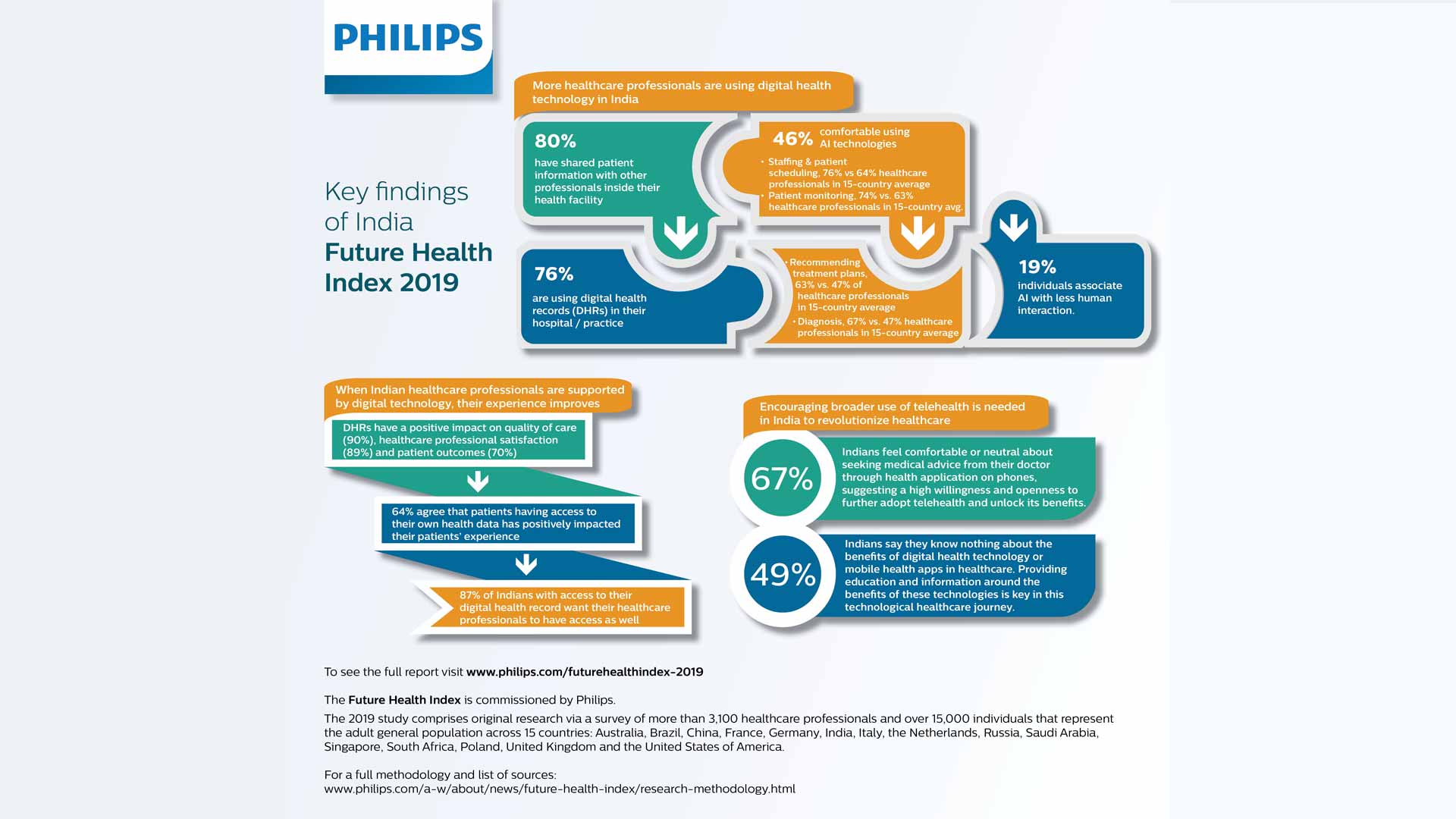The Future Of Healthcare: Analysis Of The Philips Future Health Index 2025 On AI

Table of Contents
AI-Driven Diagnostics and Personalized Medicine
The Philips Future Health Index 2025 highlights AI's potential to revolutionize diagnostics and personalize medicine. AI algorithms are becoming increasingly sophisticated, leading to significant advancements in both areas.
Enhanced Diagnostic Accuracy
AI is dramatically improving the speed and accuracy of medical diagnoses. By analyzing medical images (X-rays, CT scans, MRIs) and patient data, AI algorithms can detect subtle anomalies often missed by the human eye. This leads to:
- Earlier disease detection: AI can identify cancerous tumors, cardiovascular issues, and other critical conditions at earlier stages, improving treatment outcomes.
- Increased efficiency: AI automates tasks like image analysis, freeing up healthcare professionals to focus on patient care and complex cases.
- Reduced human error: AI algorithms minimize the risk of human error associated with manual interpretation of medical data. Examples include AI applications in:
- Cancer detection (e.g., identifying malignant cells in biopsies)
- Cardiovascular risk assessment (e.g., predicting heart attacks based on patient data)
- Early detection of diabetic retinopathy
Tailored Treatment Plans
AI facilitates personalized medicine by analyzing vast amounts of patient data, including genetics, lifestyle, and medical history. This allows for the creation of customized treatment plans:
- Optimized medication: AI algorithms can predict the most effective medication and dosage for individual patients, minimizing adverse reactions.
- Improved treatment outcomes: Personalized treatment plans lead to better outcomes and improved patient satisfaction.
- Reduced healthcare costs: By preventing hospital readmissions and optimizing treatment, personalized medicine can significantly reduce healthcare expenses. Examples of AI-powered platforms for personalized treatment include:
- AI-driven drug discovery and development platforms
- Personalized cancer treatment planning tools
- AI-powered clinical decision support systems
AI in Remote Patient Monitoring and Telehealth
The Philips Future Health Index 2025 emphasizes the crucial role of AI in expanding access to healthcare through remote patient monitoring (RPM) and telehealth.
Expanding Access to Care
AI-powered RPM devices and telehealth platforms are breaking down geographical barriers and improving access to healthcare, particularly for:
- Patients in remote areas: Wearable sensors and smart home devices provide continuous monitoring of vital signs, enabling timely interventions.
- Patients with mobility issues: Telehealth consultations eliminate the need for travel to healthcare facilities. Examples of AI-powered RPM devices include:
- Wearable sensors that track heart rate, blood pressure, and activity levels
- Smart home devices that monitor medication adherence and fall detection
Proactive Healthcare Management
AI algorithms analyze data from RPM devices, identifying potential health issues before they escalate into serious problems:
- Early warning systems: AI-driven alerts notify healthcare providers of potential complications, allowing for proactive interventions.
- Reduced hospitalizations: Early detection and intervention prevent hospital readmissions and reduce healthcare costs. Examples of AI-driven alerts and notifications include:
- Alerts for irregular heart rhythms
- Notifications for medication non-adherence
- Early warnings of potential sepsis
Addressing Ethical and Practical Challenges of AI in Healthcare
While the potential benefits of AI in healthcare are immense, it's crucial to address the ethical and practical challenges:
Data Privacy and Security
Protecting patient data is paramount. Robust security measures and adherence to regulations like HIPAA are essential to prevent data breaches and maintain patient confidentiality.
- Data encryption and anonymization: Employing strong encryption and anonymization techniques protects sensitive patient information.
- Regular security audits: Regular security audits identify and address potential vulnerabilities.
Algorithmic Bias and Fairness
AI algorithms can perpetuate existing biases if trained on biased datasets. This can lead to disparities in healthcare access and outcomes. Mitigation strategies include:
- Diverse and representative datasets: Using datasets that accurately reflect the diversity of the population.
- Bias detection and mitigation techniques: Implementing methods to identify and correct biases in algorithms.
Integration and Adoption Challenges
Integrating AI technologies into existing healthcare systems can be challenging, requiring:
- Interoperability: Ensuring seamless data exchange between different systems.
- Workforce training: Providing healthcare professionals with the necessary training and skills to use AI tools effectively.
- Cost considerations: Addressing the significant investment required for AI implementation.
Conclusion: The Future of Healthcare: Embracing AI's Potential
The Philips Future Health Index 2025 strongly suggests that AI will play a transformative role in healthcare. AI-driven solutions offer significant improvements in diagnostic accuracy, personalized treatment, access to care, and proactive healthcare management. However, responsible development and deployment are crucial, requiring careful attention to data privacy, algorithmic bias, and integration challenges. To learn more about the future of healthcare technology and the insights from the Philips Future Health Index 2025, explore the report and actively participate in discussions on AI in healthcare and the future of artificial intelligence in medicine. Embrace the potential of AI to build a healthier future.

Featured Posts
-
 Todays Losses Frankfurt Dax Market Close
May 24, 2025
Todays Losses Frankfurt Dax Market Close
May 24, 2025 -
 Escape To The Country Things To Consider Before You Relocate
May 24, 2025
Escape To The Country Things To Consider Before You Relocate
May 24, 2025 -
 Paris In The Red Luxury Goods Crisis And Its Economic Consequences
May 24, 2025
Paris In The Red Luxury Goods Crisis And Its Economic Consequences
May 24, 2025 -
 Escape To The Country Making The Move To A Rural Lifestyle
May 24, 2025
Escape To The Country Making The Move To A Rural Lifestyle
May 24, 2025 -
 Artfae Daks Alalmany Atfaq Tjary Jdyd Byn Alwlayat Almthdt Walsyn
May 24, 2025
Artfae Daks Alalmany Atfaq Tjary Jdyd Byn Alwlayat Almthdt Walsyn
May 24, 2025
Latest Posts
-
 Breaking Stock Market News Tax Bill Passed Market Reactions Bitcoin Price
May 24, 2025
Breaking Stock Market News Tax Bill Passed Market Reactions Bitcoin Price
May 24, 2025 -
 Live Stock Market Coverage Bond Sell Off Dow Futures Bitcoin Rally
May 24, 2025
Live Stock Market Coverage Bond Sell Off Dow Futures Bitcoin Rally
May 24, 2025 -
 Stock Market Update House Passes Tax Bill Impact On Bonds And Stocks
May 24, 2025
Stock Market Update House Passes Tax Bill Impact On Bonds And Stocks
May 24, 2025 -
 7 Billion Theme Park Universals Bold Bid To Rival Disney
May 24, 2025
7 Billion Theme Park Universals Bold Bid To Rival Disney
May 24, 2025 -
 Fatal Shooting Outside Jewish Museum Israeli Embassy Staff Casualties Confirmed
May 24, 2025
Fatal Shooting Outside Jewish Museum Israeli Embassy Staff Casualties Confirmed
May 24, 2025
